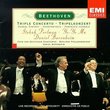| All Artists: Rachmaninoff, Weissenberg Title: Preludes Members Wishing: 0 Total Copies: 0 Label: RCA Release Date: 12/10/1990 Genre: Classical Styles: Historical Periods, Modern, 20th, & 21st Century, Instruments, Keyboard Number of Discs: 1 SwapaCD Credits: 1 UPC: 090266056828 |
Search - Rachmaninoff, Weissenberg :: Preludes
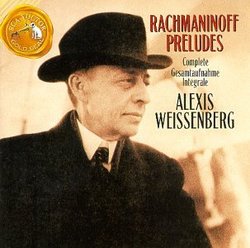 | Rachmaninoff, Weissenberg Preludes Genre: Classical
To put it plainly, this is the finest recording of Rachmaninoff's complete Preludes I have ever heard. Alexis Weissenberg has the amazing technique and the expansive temperament to make each of these pieces a memorable ... more » |
Larger Image |
CD DetailsSynopsis
Amazon.com To put it plainly, this is the finest recording of Rachmaninoff's complete Preludes I have ever heard. Alexis Weissenberg has the amazing technique and the expansive temperament to make each of these pieces a memorable experience. In these very colorful performances, he gives us very authentic- sounding Rachmaninoff with all the qualities I want to hear in the music. I may prefer some individual performances by Rachmaninoff himself or by Sviatoslav Richter, but neither recorded anything like the complete series. With the former contents of two entire LPs on this mid-priced set, this is an outstanding bargain. --Leslie Gerber Similar CDs
Similarly Requested CDs
|
CD ReviewsArriving at the Summit Avid Reader | Franklin, Tn | 10/14/2003 (5 out of 5 stars) "It is really difficult to begin praise for his exalted work of art. The clarity, tone, phrasing, interpretation...flawless. Technical problems seemed to have vanished in the hands of this genius. I listened to some selections several times WITH the musical score, not believeing that human hands had created such sonority.While the Preludes are not as technically difficult or as artistically challenging as the Etude-Tableaux, they are still only for advanced students of the instrument. One problem faced by all interpreters of Rachmaninoff's piano music is that of technical prowess. What seemed easy or "doable" to him was absolutely impossible for others. For this reason he rewrote the second Sonata so as to make an "easier" version accessible to a wider audience.These pieces cover a range of emotions but have several common characterists - an overall moodiness (Rachmaninoff excelled in the minor keys which he deemed richer), internal rhythms and melodies, an awesome technique and melodic poetry. Many could be cited as "great" but No. 8 (C Minor), No 10 (E Flat Minor), No. 21 (B Minor) and the last, 24. (D Flat Major) stand out, particularly the last which reminds one of a mighty hymn." The best rendition of Rachmaninov's preludes I have heard. Avid Reader | 11/12/1998 (5 out of 5 stars) "Unlike other recordings of the preludes, this one is not too slow, too dragging, or too introspective. Weissenberg plays parts fast that are meant to be played fast, loud that are meant to be played loud, and is truest to the russian feeling of the compositions. These compositions took on additional meaning for me when I lived in Saint Petersburg, Russia, for two years, and I highly recommend them for piano and music lovers." Astonishing performance M. Young | Boise, Idaho | 10/27/2004 (5 out of 5 stars) "There are a few recordings, rare gems, that stand head and shoulders above the rest and this is one of them. It deserves to be heard more widely.
Rachmaninoff wrote the preludes in three sets. The first (Op. 3, No. 2) when he was only 19 years old and the other two sets more than 10 years later. Each prelude is written in a different key, just as Chopin did with his preludes. Weissenberg states in the liner notes that a great performance should sound spontaneous, as if the performer sat down and the music just poured out. In this recording, at least, he accomplishes that goal. His rendition of the famous Opus 3, No. 2 Prelude is astonishing and by far the best I've heard. It is rich, complex, fiery, and seems to leap from Weissenberg's hands as if he is channeling Rachmaninoff himself. Several of the preludes, such as Opus 23, Nos. 1 and 2 sound very much like Chopin, whom Rachmaninoff admired. Overall, the Opus 23 preludes are more engaging while the Opus 32 preludes are darker and more complex. My favorites are Opus 3, No.2 and Opus 23 Nos. 3 and 5." |

 Track Listings (24) - Disc #1
Track Listings (24) - Disc #1

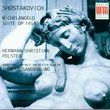

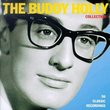

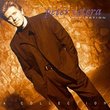
![A & E Biography: A (Musical) Anthology [ENHANCED CD]](https://nationalbookswap.com/cd//m/13/4613/354613.jpg)
